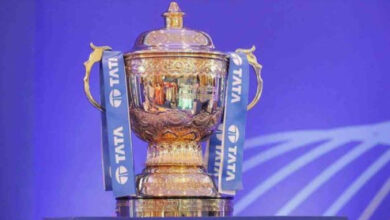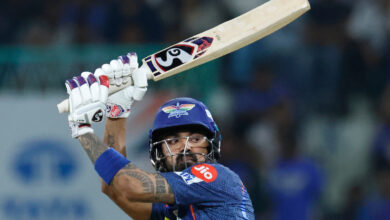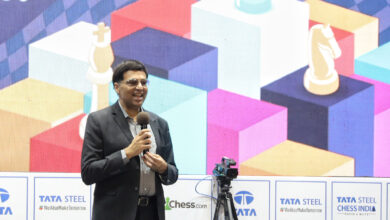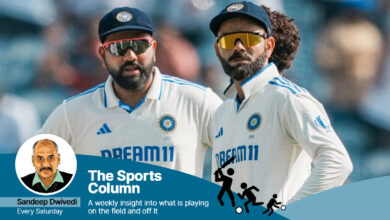Carlsen-Praggnanandhaa, a study in contrast: Motherly love vs fatherly bond, simplicity vs tinkerman | Chess News

After three days of intense chess across two formats, Magnus Carlsen finally managed to win the FIDE World Cup for the first time in his career on Thursday. He defeated India’s R Praggnanandhaa in the final, but not before the 18-year-old teenage prodigy had dragged him through the tie-breaker. In days to come, every time the two chess stars meet, there will be a buzz around those games. The 2023 World Cup could have started a rivalry between two players whose backgrounds could not have been more dinct.Let’s first start with the boy from Chennai. Every time Praggnanandhaa exits the chess hall, his eyes wander for his mother Nagalakshmi, usually slunk into an anonymous corner of the corridor, fidgeting nervously on the loose strands of her saree’s pallu. Spotting her, his strides gather pace and he hugs her, whether he has lost or not. His eyes stifle the welling-up tears, her’s shine with love. She doesn’t want to know the game’s result, she doesn’t query about a move gone astray, or she doesn’t congratulate him on maneuvering past a difficult situation.She doesn’t know the intricate patterns of the battle unfolding on the 64-square board; she doesn’t always know the intense fight of wits tossing and tumbling in his son’s head. All she knows is that she wants to be her son, just as he wants her to be too. For almost a decade, from the time he was a shy, scrawny child to a brling teenager on the cusp of youth, she has travelled with him for most of the tournaments, watching his son walk block–block to sporting greatness, with the joyfully pounding heart of a proud mother, and keeping him warm with his favourite sambar and tomato rice in his hotel room and her unconditional love. “She is the backbone of my success,” Praggnanandhaa has once told this newspaper. A humble housewife has become something of a Mother’s Day icon.
Back in Norway, they talk about a father. Henrik Carlen has been to Magnus what Nagalakshmi has been her son. For a long time, he was everything from his logics manager to his guide, from financial consultant to agony uncle to a fellow Karaoke singer. His mother Sigrun, a chemical engineer, knows chess, but rarely accompanies him or watches her son locked in a combat. “It makes her nervous, she says. She says she can’t res her emotions,” Henrik, an information technology consultant, had once said.
🏆 Magnus Carlsen is the winner of the 2023 FIDE World Cup! 🏆
Magnus prevails against Praggnanandhaa in a thrilling tiebreak and adds one more prestigious trophy to his collection! Congratulations! 👏
📷 Stev Bonhage #FIDEWorldCup pic.twitter.com/sUjBdgAb7a
— International Chess Federation (@FIDE_chess) August 24, 2023
The Carlsens introduced their son, as well as their three daughters, early into the world of puzzles. When Magnus was four, he spent six hours building a train out of plastic Legos blocks. A year on, he knew all the countries in the world, with capitals, populations, area and flags, besides being able to rattle out the names of 400-plus municipalities in Norway. One of his party tricks, his friend and chess player Håkon Hapnes Strand, says, “was to try to recognize a random position in a random chess book and state the name of the players as well as the year and the place the game was played.”
His mother was stern, and limited his internet time to two hours a day, but when she was not around he and his father would have cheat days, spending hours online. Henrik too was a tournament chess player, and introduced his children into chess when they were barely five. Magnus wasn’t initially interested in the sport, but would fall in love with it when he turned 8.
Praggnanandhaa’s father, who works at a co-operative barely, barely knew chess and his children, he and his ser and WGN R Vaishali, spent most of their childhood hours watching television or zipping through the narrow lanes of their neighbourhood in Padi, a dusty suburb in Northern Chennai in Thiruvallur drict, which has a population of 68,000, that is nearly one-fifth of the entire Norway. Most of his neighbours are employed at the TVS or Britannia factories on the road to Ambattur.
The locale Carlsen grew up, Lommedalen, had barely 5000 people. Ten years ago, he bought a Swiss-style mansion Holmenkollen that faces the famous Nordmarka (northern woodlands) on one side and the Bogstadvannet lake on the other. Before becoming a chess player, Praggnanandhaa had hardly traveled beyond the city; the Carlsens had spent time in Brussels and other parts of Europe. Fed up with their mischief and television time, Praggnanandhaa’s father enrolled his children at a local academy.
There, though, is a common thread in their narrative—that is a chess-playing elder ser. The first opponent was the ser, Vaishali for Praggnanandhaa and Ellen for Carlsen. Their first great moment was beating the elder ser. Vaishali and Praggnanandhaa keep a head-to-head record in a notebook. After beating his ser for the first time, Carlsen teased her so much that she did not play chess for four years. She resumed but had to play catch up.
Praggnanandhaa is the runner-up of the 2023 FIDE World Cup! 🥈
Congratulations to the 18-year-old Indian prodigy on an impressive tournament! 👏On his way to the final, Praggnanandhaa beat, among others, world #2 Hikaru Nakamura and #3 Fabiano Caruana! winning the silver… pic.twitter.com/zJh9wQv5pS
— International Chess Federation (@FIDE_chess) August 24, 2023
But despite the contrasting upbringing, Praggnanandhaa completed his GM norms at a younger age than Carlsen, achieving it six months faster than Carlsen. Then Carlsen was not serious about chess until he was 12. But his growth was so meteoric that in another decade’s time, he would become a world champion. That’s the buzzing ambition of Praggnanandhaa too.
Like Carlsen, Prag is an attacker
Like most of Praggnanandhaa’s generation, Carlsen is his idol. He has a whole folder of Carlsen’s game’s in his computer. He analyses and studies most games of Carlsen. Like the Norwegian, he prefers a fast, aggressive game. In the past, he would gamble wildly, especially with black pieces, and end up self-destructing.
Post pandemic, though, he has improved his strategic game and added more layers into his defending side. Fundamentally, though, he is an attacker, prone to risks and sacrificing. So was Carlsen, and according to his childhood coach Simen Agdestein, his play was characterized “a fearless readiness to offer material for activity”.
You can follow our liveblog for the Praggnanandhaa vs Magnus Carlsen FIDE World Cup final here
But such an approach would be ill-conceived at the highest stage, and he retooled himself to a more rounded player, versed in attack and defence, counter-punch and counter-defence. No one could wield such world-conquering for such a long time without different dimensions to their game. Garry Kasparov, writing for chess.com, observed that “he has a positional style similar to that of past world champions such as Anatoly Karpov, José Raúl Capablanca, and Vasily Smyslov, rather than the tactical style of Alexander Alekhine, Mikhail Tal, and myself.” His game is like peak Novak Djokovic’s, an all-court conqueror.
Tinkerman vs keeping it simple
The Norwegian is not someone who would spend hours on opening preparations. It was the middle game that fascinated him. He calls it the real chess, where he deliberately gets into tactically complicated positions and outwits the opponents. But for Praggnanandhaa’s style, more simple and uncomplicated, he needed the robustness of openings. So he sat with his coach RB Ramesh during the pandemic and tightened up the loose opening techniques. “My strategy is to avoid complications and go for simple positions. Play simple chess,” he had once said. But playing simple chess, as the grandmaster on the football field Johan Cruyff once said about his sport, is the most difficult thing.
Kids growing up fast https://t.co/iVEleJkJZm
— Anish Giri (@anishgiri) August 23, 2023
Across the board, both are often serene and unperturbed. The Indian talks with his eyes and the movements of his hands, which are sometimes folded or which are sometimes placed on his chin. Carlsen talks with subtle facial expressions, often a frown, a half-smile, a blood-shot stare sometimes. He often slants his head to one side with one arm as a support, and avoids eye contact with his opponents. Carlsen breathes a calm swagger, Praggnanandhaa a swaggering calmness. Carlsen sometimes crushes his adversary with the sheer weight of his personality; Praggnanandhaa kills them with his soft-eyed deception. There is a kindredness of spirit that ties them, both are ferociously ambitious and unforgiving to defeats, both are primarily aggressive players forced to curb their aggression to win medals and trophies, both are driven the love for the game and not the push for glory, though these emotions manifest differently, homed the society and culture they are born into.Most Read
1
69th National Film Awards 2023 complete winners l: Rocketry, Alia Bhatt, Kriti Sanon, Allu Arjun win big
2
69th National Film Awards 2023 Live Updates: Rocketry, Allu Arjun, Alia Bhatt, Kriti Sanon bag top honours
See More
Monotony is a word that Carlsen dreads. “The day it (chess) feels like a chore, I will quit,” he had once told Lex Fridman in a podcast. Staying true to his words, he refused to defend his World Championship crown last year because he could not put himself through the rigours of laborious preparations.
His life does not revolve around chess alone. He is a keen follower of football, jets to watch big games of Real Madrid, his favourite football club, is a Fantasy Football freak (and good enough to come third in one season), a fitness and skiing enthusiast, and loves his poker too. He has a well-defined politics— his own admission is a social democrat. He has a well-stocked book shelf, where he has stacked books on military leaders—he admires Napoleon—as well as comics and chess books. He endorses a string of brands, has been a model for luxury denim brands and has invested heavily in sports entertainment, besides co-founding Play Magnus, which has a market capitalization of about $115 million.
A world outside chess is foreign to Praggnanandhaa. He barely watches other sports—the only non-chess time is spent watching comedy Tamil movies, according to Vaishali—let alone play. He tunes into devotional songs—the sacred ash that he smears on his forehead captures his spirituality. His family worships Kalki (a self-styled godman who was immensely popular in Tamil Nadu in the 90s). Of late, he has learnt to play hand-badminton with contemporaries like Nihal Sarin. Often, though, his mind is whirling around the mystique shapes of the wooden board. Not that he is a recluse or introvert, but it is just that his world revolves around the chessboard and its infinite possibilities. He is at a stage where monotony has yet to creep in, he has titles, medals and trophies to hoard. But even if conquers everything a chess player could, it’s unlikely that boredom would creep in. He is wired differently to Carlsen, inhabiting a different world, though those worlds blend and blur on a chess board.







